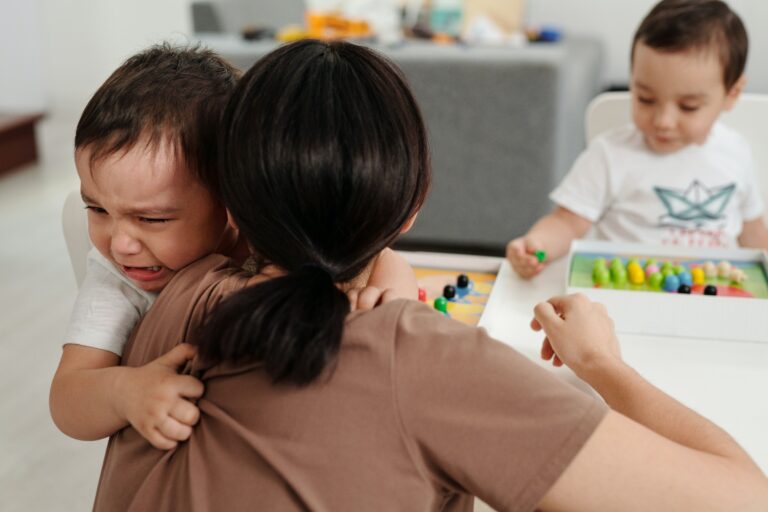The other day I was playing a game of “Go Fish with Letters” with my five-year-old. Lately, playing games with him is a gamble, as he is still learning how to handle the feelings associated with losing. Despite this, we were having fun – laughing, chatting, and enjoying spending time together. Then, my son asked me if I had an “M for mouse.” I did not, and so, like I had done many other times throughout this game I said, “go fish,” and he lost it.
When I say lost it, I am talking on the floor rolling around full body sobs. It was so loud that my husband, who was working downstairs, texted to make sure my son had not severely injured himself.
If I’m being honest, I was not my most patient mom-self in that moment. It was the end of the day, I was tired, we had almost finished the game, and the switch in his demeanor caught me completely off-guard. In addition, I was trying to ensure that his one-year-old sister did not get taken down by his flailing legs and arms.
Although I had little left to give that day, I was able to remind myself to take deep breaths before reacting. I then resorted to one of my go to strategies – validation. For the next 15 minutes (which, yes, felt like a very long time), I validated his feelings by saying things like, “I know that you are really disappointed that mommy did not have an M letter and you had to go fish.”
Since I was depleted, my validation statements were communicated in a pretty monotone voice and lacked the compassion I usually put with these statements. However, I knew some validation was better than nothing and like I said, it was all I had to give in that moment.
My son continued to cry and at times it felt like there was no end in sight to his big feelings. I kept validating because it was all I could do to keep from sobbing myself. After 15 minutes of sobbing and validation, my son looked at me and fell into my body with softer, sadder sobs. He told me that his best friend told him he no longer wanted to be best friends that day. My heart ached for him.
His behavior over not getting an “M” card became so much clearer to me at that moment. He was feeling hurt, rejected, and lonely about his friend. Yet he had no way of expressing those complex feelings that were bubbling up inside of him and then when it felt like he could not possibly hold onto the pain anymore his emotions quite literally burst out of him.
Looking back, I wish I had been more patient and more compassionate when he was crying over our game. Unfortunately, at the time, I was depleted and just did not have the energy to fully engage. However, I am happy that I gave him space to feel his feelings which ultimately allowed him to work through the events of the day and share his hurtful experience with me.
This situation made me think about all the times my kids cry over seemingly minor things and the importance of remembering that what I think my kids are crying or are upset about may only be the tip of the iceberg regarding what they are actually experiencing.
I’m not saying I always have space, mental capacity or even the ability to regulate myself to explore what is going on every time my son is upset. However, I am working on reminding myself the next time my kids are melting down over what may be perceived as an insignificant event to try and approach it with curiosity and remember that it may not be about the M.


